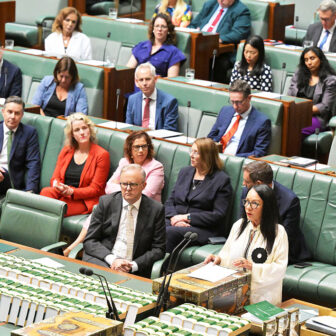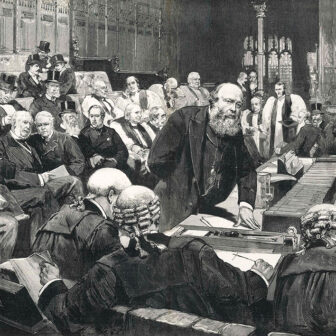When the Albanese government asked citizens to help develop its National Housing and Homelessness Plan, almost 1200 people joined community forums, webinars, stakeholder roundtables and targeted discussions run by consultants to the Department of Social Security. DSS also received more than 500 written submissions via its Engage platform, a quarter of them from individuals, the rest from organisations.
The result of all that consulting has just been summarised in a thirteen-page report that shows respondents want governments to do much more than just “manage” homelessness. They want them to prevent and eliminate it by making sure “all Australians have access to safe and adequate housing.”
The summary identifies twelve principles to guide the plan towards this worthy outcome. The principles are sound, and include recognising housing as a basic human right, ensuring housing is accessible and sustainable, and engaging people who have experienced homelessness in designing programs and services. They also propose a “housing first” approach to homelessness that gives people a home before helping them to deal with challenges like mental illness, addiction and unemployment.
The report lists a few practical suggestions too, including stronger tenants’ rights and inclusionary zoning rules to guarantee new residential developments incorporate social and affordable housing.
Many of its key proposals, though, come down to money: building more social housing where it is most needed, for example, and providing sufficient homelessness services to meet demand.
Such aims can’t be achieved without a much higher level of dedicated, consistent government funding. Indeed, the report includes “secure funding and support” as one of its twelve guiding principles. Yet it offers no guidance as to how the necessary revenue might be raised. This is not because people engaged in the consultations failed to put forward ideas; rather, it’s because the most obvious way to secure funding for housing initiatives is to change the way housing is taxed and that’s something the government doesn’t want to talk about. Right from the start the consultation was framed to bracket out any such discussion.
Two new pieces of research reinforce just how glaring and regrettable this exclusion is.
The Centre for Equitable Housing has drawn together current and historical budget data from across different government portfolios to provide a comprehensive picture of federal housing expenditure over time. It found that tax concessions like negative gearing and the capital gains tax discount are eclipsing expenditure on other housing programs. The combined annual value of these tax breaks is more than ten times the sum Canberra disburses each year to the states and territories to build social housing and tackle homelessness. As a result, 43 per cent of federal government housing support is flowing to the top fifth of income earners, while just 23 per cent goes to the bottom fifth.
The report also found that the numerous but disparate housing-related measures in the federal budget lack clearly articulated objectives. In their absence, negative gearing and the capital gains tax discount operate as “a shadow housing policy” driving up prices by encouraging speculative investment in existing housing stock rather than new construction.
The Everybody’s Home campaign, meanwhile, has calculated that the revenue lost to investor tax breaks over the coming decade could fund 550,000 new homes for low-income households. That would be more than enough to eliminate social housing waiting lists around the country.
The single mention of tax in DSS’s summary of its consultations comes in this sentence: “Private investors and landlords need incentives like tax breaks and subsidies to provide more social and affordable housing.” It’s as if negative gearing and the capital gains tax discount are invisible, or don’t exist, and we’re being asked to invent a set of new industry supports to build affordable homes without any reference to the multibillion-dollar concessions already in place.
Again, this isn’t because participants in DSS’s consultations forgot to mention negative gearing and the capital gains discount. Both were raised at the “community conversation forum” I attended in Geelong (and not just by me). While DSS has yet to upload all 517 submissions to its Engage platform, many of those that are available raise tax reform as an essential consideration in the development of the national housing plan. These include submissions by local governments such as the City of Melbourne and Brimbank City Council, by housing providers and support services such as Mission Australia and the Western Homelessness Network, and by expert organisations such as RMIT’s Centre for Urban Research and SGS Economics and Planning.
In a joint submission, the peak industry bodies National Shelter and the Community Housing Industry Association state the problem clearly:
Currently the ability for housing markets to supply enough homes to meet the population’s needs is distorted by settings for capital gains tax and negative gearing that prioritise speculative housing acquisition for capital return over strategies that aim to ensure every household is able to meet their need for affordable housing. A key goal for the Plan should be to explore opportunities to apply taxation settings that support achievement of long-term housing outcomes over speculative investment returns.
True, statements like this go beyond the narrow focus areas offered up for discussion in the original DSS issues paper, and every page of the summary report includes a disclaimer that it “may not include all views presented by stakeholders.” Yet the same disclaimer says that the document doesn’t represent the views of the Australian government. So even though Labor finds it politically inconvenient to talk about negative gearing and capital gains tax, that’s no reason for the report to shy away from such topics.
To invite community members, housing practitioners and experts to engage in a national dialogue and then to ignore what they have to say makes a mockery of the process of consultation. The Albanese government said it wanted to hear ideas on how to tackle one of the most pressing social and economic issues confronting the nation. Many of us took that invitation at face value and went to considerable lengths to contribute. We can only feel let down. •




